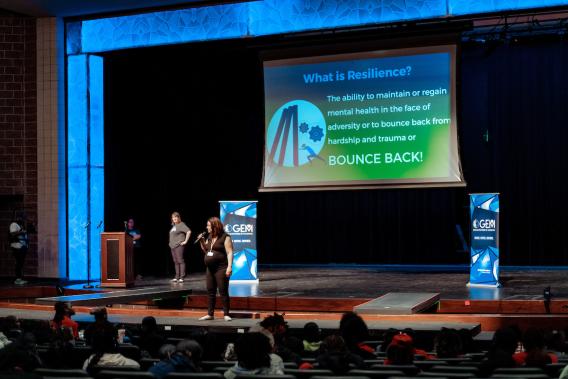Promoting Mental Health and Resilience
Resilience and risk factors related to depression in young adults is not well understood and addressing mental illness in this population will not only require screening and treatment, but also early intervention and prevention for those at risk. Particularly, little is known about how to build resilience, which is an interactive process that occurs as a result of life events, individual characteristics, and environmental influences. As we begin to understand how this process works, we may begin to identify strategies to improve resilience, and thereby reduce the risk of serious mental illness.
Blue Steel is a resilience-building education program designed to teach resilience skills and support oneself and others during stress. It invites the identification and examination of stressors, promotes positive adaptation to adversity, and encourages the lifelong development of skills to manage mental health.
Educating to improve outcomes.
Developed within the CDRC, this program highlights emotion recognition and management, relaxation response activities, and empathic relationships as protective factors to encourage an attitude of mindfulness, acceptance, and mental flexibility. Increasing feelings of self-efficacy ultimately teaches youth and young adults that they are reliable partners in their own mental health promotion.
One of the foundational components of mental illness management and prevention is the quality of resilience. Resilience is the ability to maintain or regain mental health in the face of adversity or to bounce back from hardship and trauma. Resilience is not the absence of stress. Rather, it is built upon experiences of stress or adversity, and is the hallmark of strength and success. It is vital that students grow resilience because these are the skills they will call upon throughout their lives.
Young adulthood is a challenging time when one's internal and external environments are rapidly changing. Being able to understand the role of stress, and how each individual can manage it are powerful tools one can use throughout the rest of their life.
Stress is a part of everyone's life, but students have their own unique set of stressors. Blue Steel focuses on teaching stress awareness and relaxation response activities that foster an attitude of mindfulness, acceptance, and flexibility.
Trained facilitators help students examine their challenges with a broader lens to become aware that the end of something can also be the beginning of something new.
Mental flexibility and agility are indicators of resilience and mean that we can adapt and are willing to shift our thought patterns when confronted with changing circumstances.
A foundation is one's personal set of values and something they can always go back to. Values are the fabric of one's life and their strength in challenging times. Even though these can change and evolve over time, they are always something that can relied upon. Providing students with exercises and trained facilitators that guide them through articulating their values is a critical part of Blue Steel.
Self-monitoring involves keeping a personal record of your moods and behaviors in order to track trends over time. This allows individuals to observe how their mental state changes and provides concrete data to show how they are progressing, and which symptom profiles need attention. Blue Steel connects students with the CDRC's own mental health self-monitoring tool, that provides an easy-to-use, research-driven web-based tool.
Feelings of belonging to a group or community provide a sense of purpose and support to people. Connecting with others is critical to building resilience against uncertainty, loneliness, exhaustion, and distress. Blue Steel trains students on how to consider themselves valuable mental health resources for each other, and encourages steps to reach out to each other in time of need.
Stay Connected
Be part of the great impact we're having on science and medical care across the globe.

